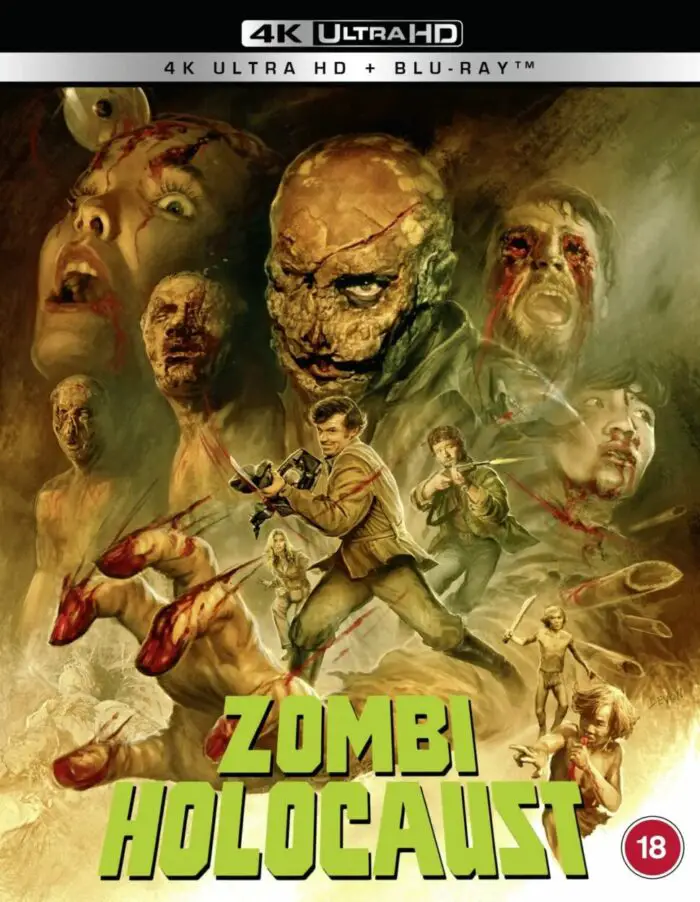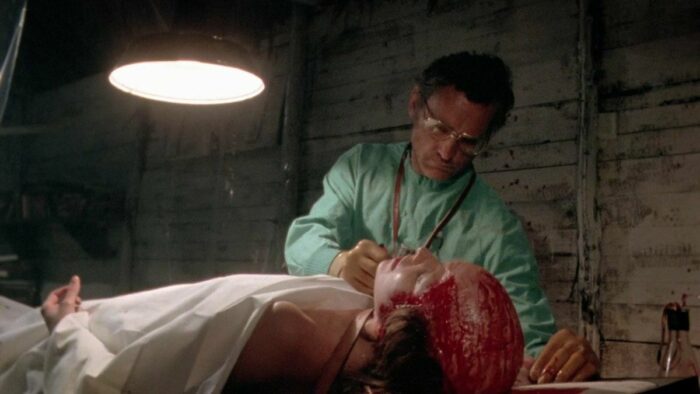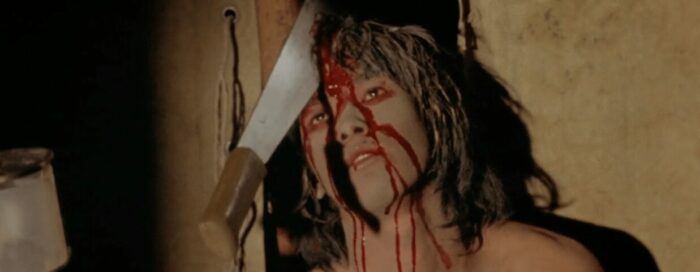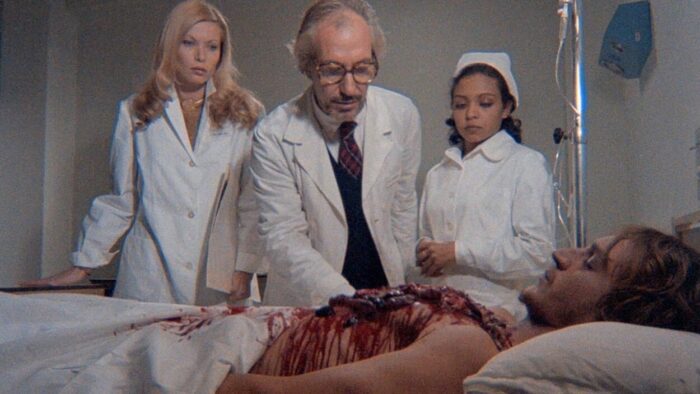Welcome to this column dedicated to my appreciation of physical media supplements called Feature Presentations. The goal of this column is not to say whether a film is good or bad and worth picking up or not- I would like to highlight the discs that go the extra mile and provide film fans with enough tasty tidbits to satisfy even the hungriest of cinephiles. Today’s article will focus on Zombie Holocaust from 88 Films.

I never have or will claim to be an expert in reviewing the technical specs of a physical media release. There are plenty of knowledgeable people in this realm of commenting on the audio and video aspects of a disc with better setups than I’ll ever own. This column, Feature Presentations, is a way of highlighting the supplemental material within a given disc. With all that out of the way, let’s get to the good stuff and dive into my review of this release.
As a disclaimer of transparency for this episode of Feature Presentations, my review of Zombie Holocaust comes from a review copy that 88 Films provided for review. All thoughts and opinions are my own.
Where to begin with Zombie Holocaust? In the 1970s and 1980s, exploitation films were wild, especially in the United States. A movie poster or film title might promise you one experience; you buy your ticket and realize the moment the film begins that you got hoodwinked. Whether it’s a title that lied to you, a trailer that promised something that underdelivered, or you got suckered in by a foreign film posing as an American release, producers knew how to snooker the audience.
When someone plops down to check out a film titled Zombie Holocaust, it’s a fair assumption you’re getting exactly that. Wrong! Instead, you get an Italian cannibal film masquerading as a zombie picture while secretly being a mad scientist movie. If your expectations aren’t in place for something as jarring as that, I’d understand your disappointment with such a piece of cinematic whiplash. It’s a lot to take in. Thankfully, I knew this going in, so having prepared myself for a slice of cinema that underdelivers, I still came away from Zombie Holocaust underwhelmed.
There’s no real need to get into the plot as the movie forgets pieces of its own story as the runtime continues. A bunch of people end up on an island with a cannibalistic tribe and a mad doctor creating zombies. There’s bloodshed and plot holes galore!
Anyone watching a movie titled Zombie Holocaust is not holding judgment for the lapses in plot or logic. Italian horror, especially zombie and cannibal subgenres, tends to put gore at the forefront, and for those seeking such bloody set pieces, the movie delivers in that regard. It’s not as significant or revolutionary as Cannibal Holocaust or Zombie Flesh Eaters, but those seeking nothing more than a grindhouse experience will find that Zombie Holocaust delivers the goods.

The 88 Films release of Zombie Holocaust is a 4K UHD/Blu-ray two-disc affair. The screener copy provided for this review was only the discs, but if you purchase from the distributor, you get a slipcover, a fold-out poster, and a booklet with new writings on the film.
The supplemental material begins with “Girolami Holocaust,” an interview with editor Alberto Moriani and Enzo C. Castellari, son of Marino Girolami. Even though the two men are contributors to this feature, primarily, “Girolami Holocaust” is a career retrospective of Alberto Moriani, with a fleeting moment of Castellari discussing Marino Girolami. Spoken in Italian with English subtitles, Moriani discusses his entry into film production, courtesy of his father, an unfortunate accident with a camera that shifted his career trajectory, and how he climbed the ladder to become a feature film editor. Those looking for details on Zombie Holocaust may leave disappointed, but if film production interests you, as it does me, “Girolami Holocaust” was a comforting slice of bonus material.
“Our Life, Our Music” is an interview with Giacomo and Edda Dell’Orso. The featurette begins with text stating that Zombie Holocaust released during the 14th year of collaboration with composer Nico Fidenco and Giacomo Dell’Orso. Giacomo married Edda Dell’Orso, the well-known vocalist of many Ennio Morricone scores, and sang in many soundtracks with her husband. For the first half of the interview, Giacomo discusses projects and creators he worked with, his approach to crafting musical compositions, and how understanding the nuances of a Moviola allowed him to excel at his craft.
Edda joins Giacomo for the latter portion of the discussion to chat about her time in the entertainment industry. Edda touches upon her multiple contributions with Ennio Morricone, how a struggle with self-confidence led to her stepping away from singing professionally, and her love/hate relationship at teaching singing after her retirement. While Giacomo’s comments are a bit dry and technical, he does well at explaining the intricacies and difficulties of being a composer pre-digital and sheds light on an area of film production not often talked about; combining that with Edda’s honest opinions about grappling with a lack of confidence and honest assessments of life after filmmaking makes “Our Life, Our Music” a treat to listen to.
“To Die and Rise in Rome” is an interview with director Marcello Avellone conducted outdoors at the Necropoli Ara del Tufo, Tuscania. More reflective than the discussions prior, Avellone muses on the importance of horror in cinema and the idea of death on screen. Avellone discusses directorial staples of Italian horror, Mario Bava and Dario Argento while analyzing how films of Italy are rooted in realism, horror, and comedy included. He also stresses the importance of horror films to the psyche, especially with teenagers, by inducing fear and the idea of death to people of a younger age, allowing them to confront such a scary topic from the comfort of their seats. Even if “To Die and Rise in Rome” doesn’t offer much to those looking for Zombie Holocaust production information, instead, you get a look into the mind of a horror director, his views on life and cinema, and deep thoughts on the idea of death.
88 Films includes a 2009 Q&A from the Manchester Festival of Fantastic Films with star Ian McCulloch. McCulloch spends the 50-plus-minute chat discussing his life and career with a droll and dry speckle of humor. I’m not usually a fan of these features; the audio and video quality can vary wildly, and the subject may not want to be there or know what to say; it’s a crapshoot with these question-and-answer sessions. However, an extra such as this might be the only way to hear from someone associated with the production, and that’s the case with the film’s headliner. While McCulloch looks visibly uncomfortable at times, and many production moments he does not recall, he is an entertaining storyteller, and, when the actor remembers details, he crafts clear and concise stories that mix as a peek behind the curtain with a sly sense of cheekiness layered on top. This Q&A didn’t change my feelings on these features, but its inclusion is appreciated, and McCulloch made for an entertaining listen.

A brief yet fascinating addition comes in the form of a restoration reel. As I mentioned at the start of this article, I don’t have the best A/V setup, and when it comes to reviewing 4K video quality, plenty of people out there are more knowledgeable than I in this department. So, seeing this short feature highlighting the restoration work before and after the 4K pass was an eye-opener.
The magnum opus on this release comes in the form of the feature-length documentary “Eaten Alive! The Rise and Fall of the Italian Cannibal Film.” This 80-minute feature cobbles together esteemed horror directors such as Ruggero Deodato and Umberto Lenzi to discuss the genre and their works to help the cannibal film excel in the late ’70s through its mid-80s downfall. Joining the directors are esteemed film scholars such as Kim Newman and Shelagh Rowan-Legg, who offer additional analytical insight into the themes of films within the subgenre and their astuteness of Italian cannibal films as a whole.
I have to come right out and say that features such as “Eaten Alive!” are why I will always champion physical media. The documentary traces the origins of the cannibal film from its humble beginnings through the end of the 1970s and the notorious Cannibal Holocaust. Zombie Holocaust follows soon after before the steep, sharp, and steady decline in quantity and quality of cannibal films petered out. All the speakers on the feature bring their A-game to offer insights into each film’s production or to break down a dissertation of the ideals seen throughout this period in cinemas. I understand “Eaten Alive!” was included on the 88 Films Blu-ray release of Zombie Holocaust, but I’m ecstatic that it made its way onto this 4K release. “Eaten Alive!” is a top-notch slice of supplemental material and is essential viewing for those who love cinema.
88 Films also includes a feature-length audio commentary featuring Adrian Smith with moviesandmania.com and David Filnt with reprobatepress.com. Both commentators start things off by declaring their appreciation of the film before getting into the nuts and bolts of the production. Early on, though, Smith and Flint start diverting their attention towards listing other genres and films that tie into Zombie Holocaust for multiple minutes at a time. At first, I was on board, but as the track continued, I noticed them slipping back into this more often than not while only occasionally offering production details or analysis. While the discussion isn’t terrible, it was underwhelming even though both men have an affinity for Zombie Holocaust; I wish the conversation spent more time digging into the nuances of this 1980 movie.
The physical media release closes with the film’s theatrical trailer.

And there you have it! While Zombie Holocaust is a misleading title and doesn’t hold as much significance as other films in the zombie and cannibal subgenres, those who need their exploitation itch scratched will find plenty of relief with this 1980 film. Packed with plenty of interviews and a can’t-miss documentary, the 88 Films 4K UHD/Blu-ray release of Zombie Holocaust gives this grindhouse entry plenty of love and care.




